Real Steel
 for some violence, intense action and brief language.
for some violence, intense action and brief language.
Reviewed by: Raphael Vera
CONTRIBUTOR
| Moral Rating: | Better than Average |
| Moviemaking Quality: |
|
| Primary Audience: | Teens Adults |
| Genre: | Sci-Fi Action Adventure Fantasy Drama IMAX |
| Length: | 2 hr. 7 min. |
| Year of Release: | 2011 |
| USA Release: |
October 7, 2011 (wide—3,300+ theaters) DVD: January 24, 2012 |
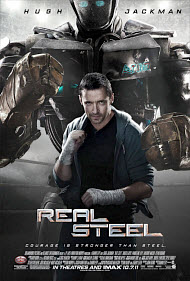

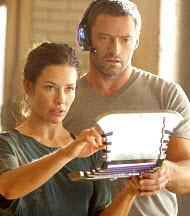

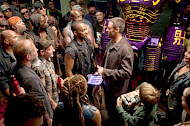
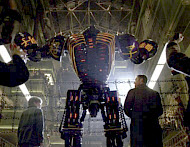
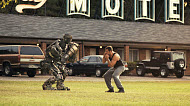
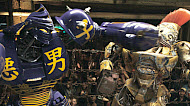
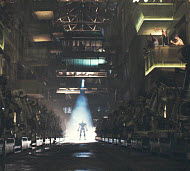
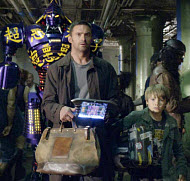
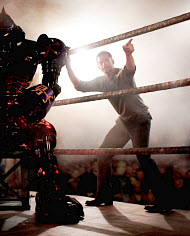
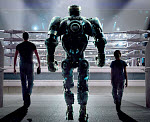
The sin of PRIDE versus humility
“Pride goes before destruction and a haughty spirit before a fall” —Proverbs 16:18
Father son relationship
Courage
Challenges of changing careers
| Featuring |
|---|
|
Hugh Jackman … Charlie Kenton Evangeline Lilly Kevin Durand … Ricky Anthony Mackie Hope Davis Phil LaMarr … ESPN Boxing Commentator Dakota Goyo … Max James Rebhorn Olga Fonda … Russian robot owner See all » |
| Director |
|
Shawn Levy |
| Producer |
|
Touchstone Pictures DreamWorks SKG 21 Laps Entertainment See all » |
| Distributor |
“Courage is stronger than steel.”
In the near future boxing has become a “robots only” sport and many of the former boxers, like Charlie Kenton (Hugh Jackman), have resigned themselves to living vicariously through the robots that now do the fighting for them.
Charlie is traveling the countryside looking for any cut rate venue that will pay for a robot exhibition match when he is told that Max (Dakota Goyo), the 11 year old son he left behind, is now motherless, and he has custody. Willing to give him up to Max’s rich aunt and uncle, for the right price that is, he now has the money to buy the next “sure thing” robot on the condition that he has to take care of Max for the summer.
Former girlfriend and the daughter of Charlie’s original trainer, Bailey (Evangeline Lilly) still maintains the Gym that her dad left her to honor both him and the sport that they all loved. This is where Charlie always goes to repair his robots and where he now takes Max.
While scrounging for robot parts Max discovers an early generation “sparring” robot named Atom buried in mud and all but forgotten. Charlie thinks it’s a piece of Junk, but Max believes in Atom and soon father and son are spending the summer working together to turn an old training robot into a fighter.
Objectionable content
Language: Moderate. A half dozen uses of the Lord’s name in vain two of which were the abbreviated “jeez”, a single use of “hell”, seven mentions of ass as in “getting a__ kicked”, “you suck”, “you screwed me”, “SOB, “bit__,” “balls”, “shove it” and a single use of “sh__” were the extent of the offensive language used. Though much less frequent than other PG-13 rated films what makes it more pronounced is that half of these were said by a child.
Sex/Nudity: Minor. The most risqué shots were that of a few girls in bikini’s at a zoo fight and a tight fitting futuristic outfit worn by the girl holding the electronic “round card” at a bout. Charlie is seen very despondent and goes to Bailey who is asleep in bed and hugs her, but nothing is even implied. “Real Steel” is a very clean film in this regard.
Violence: Moderate. There are several fights with one in particular where a gang promises to beat Charlie to within an inch of his life. Some blood is seen as well as kicking to his head but often from a distance. The robot matches were where the most extreme fighting took place. Though often fought “to the death” they were very violent and often cost the loser a limb or two. Thankfully, the robots were portrayed as mindless automatons, mere extensions of their masters, so the audience is less emotionally attached amidst the devastation.
Lessons
Early on, Bailey tells Charlie that all she wants to do is save her dad’s gym. It is here that she asks him, “What do you want?” Though he doesn’t reply, we already know the answer. Charlie’s love of boxing is now secondary to his desire for money. He foolishly continues gambling and making bets too large to pay off so his enslavement to money isn’t even profitable. The Bible speaks clearly on this:
“Dishonest money dwindles away, but he who gathers money little by little makes it grow” Proverbs 13:11.
“Whoever loves money never has money enough; whoever loves wealth is never satisfied with his income” Ecclesiastes 5:10.
Gradually, we see how the “hope filled” Max begins to change his dad but it’s not enough, Charlie thinks, to turn him into the father Max needs. When all seems lost, a broken Charlie sorrowfully tells Max, “I’m sorry. I’m sorry.” Charlie tells his son later, “You forget who I was. You deserve better than me!” Isn’t this the revelation that new believers in Christ have when they are on the cusp of being saved? It is only when we realize our unworthiness that we begin to be of value to God.
The words of the prodigal son come to mind when he said, “I have sinned against Heaven and against you. I am no longer worthy to be called your son” (John 15:21). And just as the father, a picture of God, welcomed him home and restored his standing so will God do to us if we admit our guilt and come to him.
“If we claim to be without sin, we deceive ourselves and the truth is not in us. If we confess our sins, he is faithful and just and will forgive us our sins and purify us from all unrighteousness” 1 John 1:8-9.
After Bailey gives Charlie some good advice, he remarks, “You sound like your dad.” Later, during a match, Bailey see’s Charlie clearly reflected in his son. Likewise, we need to reflect the character of God, for if the world does not see God in us, how can we call ourselves his children?
Before a major battle Max asks Charlie what their strategy is and Charlie says, “We fight smart and pray.” When Max doesn’t react he takes him by the hand and shows he was serious by saying, “No, pray.” This may have been a quick scene, but I still appreciated it.
I was not surprised to learn that boxing legend Sugar Ray Leonard was the consultant for the film, as the fight scenes were both exciting and the choreography, at times, very realistic. Like the Rocky films of old, it made you appreciate the art form that is boxing, generating more than a few cheers from the audience.
“Real Steel” bears little resemblance to the original “Twilight Zone” episode by Richard Matheson, but it is a good movie in its own right. Believable special effects, good cinematography, compelling battles, uplifting musical score, good acting, especially by child actor Dakota Goyo and positive messages coupled with a redemptive payoff make “Real Steel” a good film for teens and adults. Over the top violence and language make this unacceptable for pre-teens.
Violence: Moderate / Profanity: Moderate / Sex/Nudity: Minor
See list of Relevant Issues—questions-and-answers.


The fighting sequences between the robots were exciting, however. I probably could have done without Charlie’s son, Max, using the foul language. Some screenwriters think it’s cute to have a kid cursing, and Max’s language did get some giggles from the audience in theater where I saw this movie. I was concerned that Max’s use of foul language was only admonished once by his dad, and then accepted afterwards. That did not send a good message about watching one’s words, especially as Charlie continued to use foul language around his son.
I do recommend this movie, because while the draw is the boxing robots, the story’s real heart concerns the relationship between the father and his son.
Moral rating: Better than Average / Moviemaking quality: 3½
I would definitely recommend this one to fans of sports movies.
Moral rating: Better than Average / Moviemaking quality: 5
Other than the poor choices of words and too much skin from a couple of girls (which one of my boys mentioned afterwards—they DO notice these things), it was a great movie. One son stated it would have been the best movie he’d ever seen, if it wasn’t for the cursing and skin. The robots seemed alive and their movements were human. The rest of the movie was exciting and had you cheering on, as if you were watching “Rocky.”
Moral rating: Average / Moviemaking quality: 5
Moral rating: Offensive / Moviemaking quality: 3½
Although I greatly enjoyed the lively scenery and intense robot fights, my cheering was hampered by the bad attitudes, bad decisions and lousy life choices of the human characters. Throughout the film, even as the bell rung for the last time, a Bible verse kept running through my head, “Pride goes before destruction and a haughty spirit before a fall” (Proverbs 16:18). What could have been a heartwarming story got too tangled up with the filth and sin of this world. It ended up flat on the mat instead. The perfect word to describe this movie: meretricious.
Moral rating: Very Offensive / Moviemaking quality: 4
Moral rating: Better than Average / Moviemaking quality: 5
Moral rating: Very Offensive / Moviemaking quality: none

Dakota Goyo did an admirable job as Max, the estranged child of the down-and-out fight promoter. While being precocious was the plan he certainly pulled off a worthwhile performance. I guess at the end of the day, the movie would be a big noisy nothing without the excellent Dreamworks exemplary rendition of the fighting robotic “stars”. See all »
My Ratings: Moral rating: Better than Average / Moviemaking quality: 4